See also
| 19th century | |
|---|---|
| 20th century | |
| 21st century | |
Years in North America | |
|---|---|
| Sovereign states | |
Dependencies and other territories | |
This is a list of the individual Haiti year pages.

The Dominican Republic is a country on the island of Hispaniola in the Greater Antilles archipelago of the Caribbean Sea, bordered by the Atlantic Ocean to the north. It occupies the eastern five-eighths of the island, which it shares with Haiti, making Hispaniola one of only two Caribbean islands, along with Saint Martin, that is shared by two sovereign states. It is the second-largest nation in the Antilles by area at 48,671 square kilometers (18,792 sq mi), and second-largest by population, with approximately 11.4 million people in 2024, of whom approximately 3.6 million live in the metropolitan area of Santo Domingo, the capital city.

Haiti, officially the Republic of Haiti, and formerly known as Hayti, is a country on the island of Hispaniola in the Greater Antilles archipelago of the Caribbean Sea, east of Cuba and Jamaica, and south of The Bahamas and the Turks and Caicos Islands. It occupies the western three-eighths of the island which it shares with the Dominican Republic. To its south-west lies the small Navassa Island, which is claimed by Haiti but is disputed as a United States territory under federal administration. Haiti is 27,750 km2 (10,714 sq mi) in size, the third largest country in the Caribbean by area, and has an estimated population of 11.4 million, making it the most populous country in the Caribbean and the 5th most populous country in North America. The capital is Port-au-Prince.
The recorded history of Haiti began in 1492, when the European captain and explorer Christopher Columbus landed on a large island in the region of the western Atlantic Ocean that later came to be known as the Caribbean. The western portion of the island of Hispaniola, where Haiti is situated, was inhabited by the Taíno and Arawakan people, who called their island Ayiti. The island was promptly claimed for the Spanish Crown, where it was named La Isla Española, later Latinized to Hispaniola. By the early 17th century, the French had built a settlement on the west of Hispaniola and called it Saint-Domingue. Prior to the Seven Years' War (1756–1763), the economy of Saint-Domingue gradually expanded, with sugar and, later, coffee becoming important export crops. After the war which had disrupted maritime commerce, the colony underwent rapid expansion. In 1767, it exported indigo, cotton and 72 million pounds of raw sugar. By the end of the century, the colony encompassed a third of the entire Atlantic slave trade.

Hispaniola is an island in the Caribbean that is part of the Greater Antilles. Hispaniola is the most populous island in the West Indies, and the region's second largest in area, after the island of Cuba. The 76,192-square-kilometre (29,418 sq mi) island is divided into two separate nations: the Spanish-speaking Dominican Republic to the east and the French/Haitian Creole-speaking Haiti to the west. The only other divided island in the Caribbean is Saint Martin, which is shared between France and the Netherlands.

Port-au-Prince is the capital and most populous city of Haiti. The city's population was estimated at 1,200,000 in 2022 with the metropolitan area estimated at a population of 2,618,894. The metropolitan area is defined by the IHSI as including the communes of Port-au-Prince, Delmas, Cite Soleil, Tabarre, Carrefour and Pétion-Ville.

Jean-Bertrand Aristide is a Haitian former Salesian priest and politician who became Haiti's first democratically elected president. A proponent of liberation theology, Aristide was appointed to a parish in Port-au-Prince in 1982 after completing his studies to become a priest. He became a focal point for the pro-democracy movement first under Jean-Claude "Baby Doc" Duvalier and then under the military transition regime which followed. He won the 1990–91 Haitian general election, with 67% of the vote. As a priest, he taught liberation theology and, as a president, he attempted to normalize Afro-Creole culture, including Vodou religion, in Haiti.

François Duvalier, also known as Papa Doc, was a Haitian politician who served as the president of Haiti from 1957 until his death in 1971. He was elected president in the 1957 general election on a populist and black nationalist platform. After thwarting a military coup d'état in 1958, his regime rapidly became more autocratic and despotic. An undercover government death squad, the Tonton Macoute, indiscriminately tortured or killed Duvalier's opponents; the Tonton Macoute was thought to be so pervasive that Haitians became highly fearful of expressing any form of dissent, even in private. Duvalier further sought to solidify his rule by incorporating elements of Haitian mythology into a personality cult.

Nel Ust Wyclef Jean is a Haitian rapper and musician. At the age of nine, Jean immigrated to the United States with his family. He first achieved fame as a founding member, co-producer and guitarist of the New Jersey hip hop trio The Fugees, alongside Lauryn Hill and Pras Michel. The group released the albums Blunted on Reality (1994) and The Score (1996), the latter becoming one of the best-selling albums of all time. Jean would follow this with the release of his first solo studio album, Wyclef Jean Presents The Carnival (1997), which contains the top ten hit "Gone till November".

Cap-Haïtien, typically spelled Cape Haitien in English and often locally referred to as Le Cap, Okap or Au Cap, is a commune of about 190,000 people on the north coast of Haiti and capital of the department of Nord. Previously named Cap‑Français and Cap‑Henri during the rule of Henri I, it was historically nicknamed the Paris of the Antilles, because of its wealth and sophistication, expressed through its architecture and artistic life. It was an important city during the colonial period, serving as the capital of the French Colony of Saint-Domingue from the city's formal foundation in 1711 until 1770 when the capital was moved to Port-au-Prince. After the Haitian Revolution, it became the capital of the Kingdom of Haiti under King Henri I until 1820.
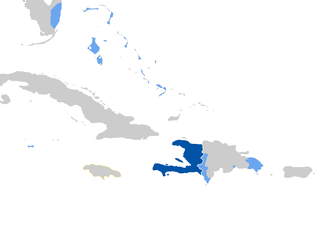
Haitian Creole, commonly referred to as simply Creole or Kreyòl natively, is a French-based creole language spoken by 10–12 million people worldwide, and is one of the two official languages of Haiti, where it is the native language of the vast majority of the population. Northern, Central, and Southern dialects are the three main dialects of Haitian Creole. The Northern dialect is predominantly spoken in Cap-Haïtien, Central is spoken in Port-au-Prince, and Southern in the Cayes area.

The United States occupation of Haiti began on July 28, 1915, when 330 U.S. Marines landed at Port-au-Prince, Haiti, after the National City Bank of New York convinced the President of the United States, Woodrow Wilson, to take control of Haiti's political and financial interests. The July 1915 invasion took place following years of socioeconomic instability within Haiti that culminated with the lynching of President of Haiti Vilbrun Guillaume Sam by a mob angered by his decision to order the executions of political prisoners. The invasion and subsequent occupation was promoted by growing American business interests in Haiti, especially the National City Bank of New York, which had withheld funds from Haiti and paid rebels to destabilize the nation through the Bank of the Republic of Haiti with an aim at inducing American intervention.

The president of Haiti, officially called the president of the Republic of Haiti, is the head of state of Haiti. Executive power in Haiti is divided between the president and the government, which is headed by the prime minister of Haiti. Prime Minister Ariel Henry currently serves as Acting President following the assassination of President Jovenel Moïse on 7 July 2021.
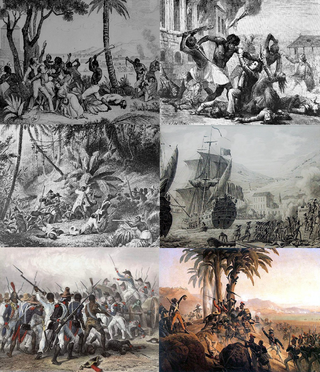
The Haitian Revolution was a successful insurrection by self-liberated slaves against French colonial rule in Saint-Domingue, now the sovereign state of Haiti. The revolt began on 22 August 1791, and ended in 1804 with the former colony's independence. It involved black, biracial, French, Spanish, British, and Polish participants—with the ex-slave Toussaint Louverture emerging as Haiti's most prominent general. The revolution was the only slave uprising that led to the founding of a state which was both free from slavery and ruled by non-whites and former captives. The successful revolution was a defining moment in the history of the Atlantic World and the revolution's effects on the institution of slavery were felt throughout the Americas. The end of French rule and the abolition of slavery in the former colony was followed by a successful defense of the freedoms the former slaves had won, and with the collaboration of already free people of color, of their independence from white Europeans.

The Haiti national football team represents Haiti in international football. Haiti is administered by the Fédération Haïtienne de Football (FHF), the governing body for football in Haiti. They have been a member of FIFA since 1934, a member of CONCACAF since 1961 and a member of the Caribbean Football Union (CFU) since 1978. Haiti's home ground is Stade Sylvio Cator in Port-au-Prince and the team's manager is Gabriel Calderón Pellegrino.

Haitian Vodou is an African diasporic religion that developed in Haiti between the 16th and 19th centuries. It arose through a process of syncretism between several traditional religions of West and Central Africa and Roman Catholicism. There is no central authority in control of the religion and much diversity exists among practitioners, who are known as Vodouists, Vodouisants, or Serviteurs.
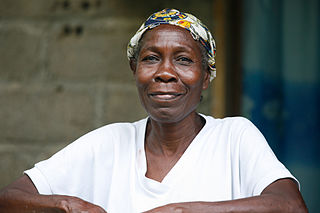
Women in Haiti have equal constitutional rights as men in the economic, political, cultural and social fields, as well as in the family.

The 2010 Haiti earthquake was a catastrophic magnitude 7.0 Mw earthquake that struck Haiti at 16:53 local time on Tuesday, 12 January 2010. The epicenter was near the town of Léogâne, Ouest department, approximately 25 kilometres (16 mi) west of Port-au-Prince, Haiti's capital.
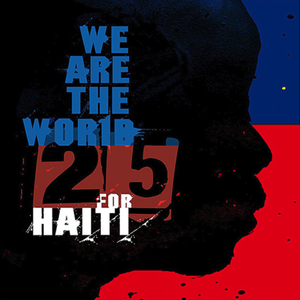
"We Are the World 25 for Haiti" is a charity single recorded by the supergroup Artists for Haiti in 2010. It is a remake of the song "We Are the World", which was written by American musicians Michael Jackson and Lionel Richie, and was recorded by USA for Africa in 1985 to benefit famine relief in Africa. Initially, in late 2009, it had been suggested to Richie and Quincy Jones—producer of the original "We Are the World"—that a re-cut version of the song be re-released under the title "Live 25". Following the magnitude 7.0 Mw earthquake in Haiti in early 2010, which devastated most of the country and killed thousands of people, it was agreed that the song would be re-recorded by new artists, in the hope that it would reach a new generation and help benefit the people of Haiti.

Haitians are the citizens of Haiti and the descendants in the diaspora through direct parentage. An ethnonational group, Haitians generally comprise the modern descendants of self-liberated Africans in the Caribbean territory historically referred to as Saint-Domingue. This includes the mulatto minority who denote corresponding European ancestry, notably from French settlers. By virtue of historical distinction, the vast majority of Haitians share and identify with this common African lineage, though a small number are descendants of contemporary immigrants from the Levant who sought refuge in the island nation during World War I and World War II.
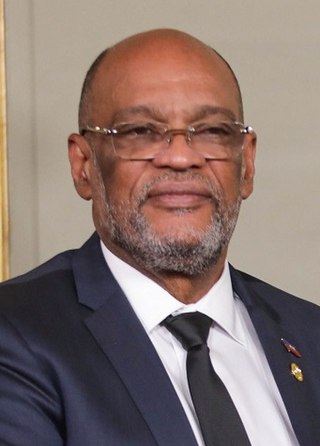
Ariel Henry is a Haitian neurosurgeon and politician who has served as the acting prime minister of Haiti since 20 July 2021 after the assassination of President Jovenel Moïse. He later became involved in a controversy due to his refusal to cooperate with the authorities over his links with Joseph-Félix Badio, one of the suspects accused of orchestrating the assassination of President Moïse on 7 July 2021. Officers who investigated the case suspected Henry was involved with planning the assassination.